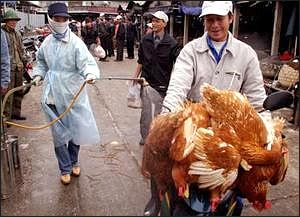The increasing dangers of bird flu
A global bird flu threat looks looming now. At the moment, there are active cases in China (the flu originated in Hong Kong) and another man had died in Indonesia on Jan 1.
 In Vietnam, the situation is also hot. A Swedish study says that here the number of bird flu cases in human may have been hugely under reported.
In Vietnam, the situation is also hot. A Swedish study says that here the number of bird flu cases in human may have been hugely under reported.And there are more concerns in Europe after 14 people in Turkey have been confirmed to have contracted the deadly disease.
The H5N1 strain of the virus has emerged in four regions in Turkey now and this has raised fears that it is sweeping west towards Europe proper.
The disease was identified in Turkey last week and three children have now died.
So what has the EU done to deter this virus from spreading throughout the continent?
For starters, the EU has banned imports of live birds and poultry products, including feather from Turkey. In additional, imports of untreated bird feathers from eastern neighbours of Turkey - Azerbaijan, Armenia, Georgia, Syria, Iran and Iraq - are also banned.
In the UK, health authorities are saying the country was moving into a new phase of pandemic planning. The government was also continuing to stockpile Tamiflu, the antoviral drug used as a first-line defence against the virus. The bad news is that the stockpile is only enough to treat 25% of the population by August.
Poultry farmers with more than 50 birds have until Feb 28 to register their flocks. It is quite worrying in the UK as last October a parrot in quarantine here died after contracting bird flu.
The spread of this disease has economic impact on the affected countries. Millions of poultry will have to be culled. Separate hospitals will have to be allocated. And money given to farmers as subsidies.
Malaysia, right in the middle of the bird flu centre now in Southeast Asia, plans to increase dedicated hospitals from the present 21. At least 15 more will be added now.
But is that enough? How stringent are the people in stopping smuggling of poultry of affected areas?
Malaysia had this problem a couple of years ago when it banned poultry from bird flu-infected Thailand but people still found ways to smuggle the birds and the virus in.
 It became so bad that at one stage the entire northern Malaysian state of Kelantan which borders Thailand was put under emergency and all types of birds culled.
It became so bad that at one stage the entire northern Malaysian state of Kelantan which borders Thailand was put under emergency and all types of birds culled.Maybe its time the antiviral drug makers remove their monopoly over the drug and allow other producers to make generic drugs.
I am sure the maker will have to yield to joint pressure put in by ALL governments.
And at the same time, poultry farmers should be careful with hygine and well being of their flocks.
A Q&A on bird flu
VISIT MY OTHER BLOG HERE


0 Comments:
Post a Comment
<< Home